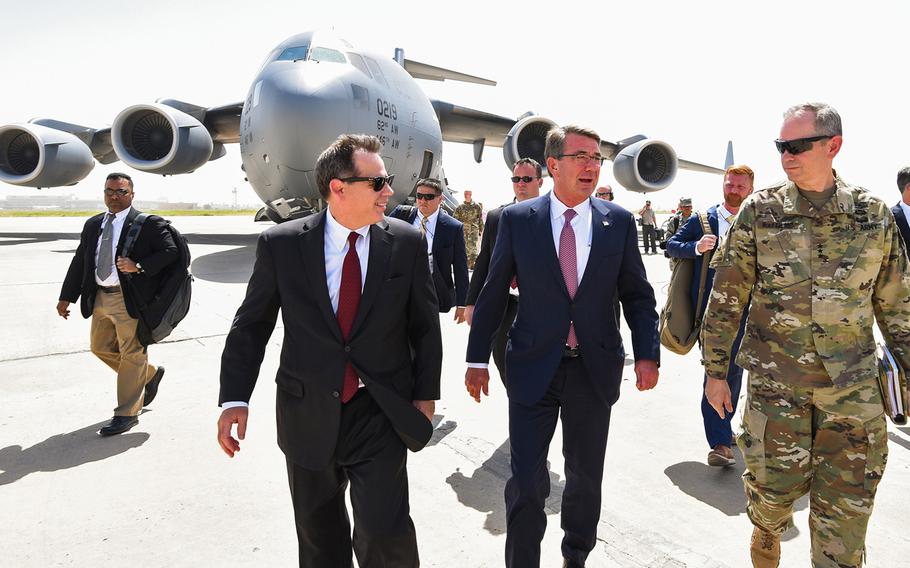
Defense Secretary Ash Carter is greeted by Army Lt. Gen. Sean MacFarland, commander of Operation Inherent Resolve, and U.S. Ambassador to Iraq Stuart Jones, as he arrives at Baghdad International Airport Monday, July 11, 2016. (Corey Dickstein/Stars and Stripes)
BAGHDAD — Iraqi security forces will establish a major air and logistics hub just south of Mosul on an air base recently recaptured from the Islamic State group, Defense Secretary Ash Carter said Monday.
Carter, who arrived in the Iraqi capital Monday morning to meet with the country’s top leaders and ground commanders, told reporters traveling with him that seizing the Qayara air base, about 40 miles south of Mosul, was the final objective the anti-Islamic State group coalition had identified in its plan for retaking Mosul. Now planning turns toward encircling and eventually capturing Iraq’s second-largest city and the Islamic State final urban stronghold, which it has held since the summer of 2014.
Carter said he’d be speaking with Iraqi Prime Minister Haider al-Abadi and Defense Minister Khaled al-Obaidi about the “next plays in the campaign” and how the U.S.-led Operation Inherent Resolve coalition can continue to accelerate the Iraqi security forces’ progress. This would include embedding advisers at smaller-unit levels as they near Mosul. He’ll also discuss planning with the president of autonomous Iraqi Kurdistan, Masoud Barzani.
“I want to hear the thoughts of Prime Minister Abadi, ensure that we are all working from the same campaign plan,” Carter said.
The American-trained Iraqi security forces and the Kurdish Peshmerga fighters will play key roles in the slow-moving Iraqi campaign to regain Mosul. The city of 2.5 million people fell to Islamic State forces after a lightning offensive in June 2014.
Iraqi troops are moving toward Mosul from the south, while the Kurdish troops prepare to assault from the north. Carter declined to provide details about the plans for the operation.
The capture of the Qayara air base last week is the latest in a series of of Iraqi victories over the Islamic State group, including the liberation of the towns of Ramadi, Fallujah, Beiji and Hit.
Qayara, which includes a runway about 2 miles long that can support a C-5 Galaxy, was used by American forces between 2003 and 2010, when it was known as “Key West.”
Defense officials, who spoke on condition of anonymity to discuss planning, described the operation as the largest armor movement by the Iraqi army since it invaded Kuwait under Saddam Hussein in 1990. But local reporting indicated the militants put up only a small fight for the air base.
A small team of U.S. and coalition troops surveyed the airfield after its capture but did not remain at the base, one of the officials said. American troops are expected to return once the Iraqis secure the area.
Among its uses, the officials said, the Qayara air base will serve as a staging area for Iraqi troops with American advisers, a logistics hub and a small fire base.
Although planning for the Mosul operations will accelerate with Carter’s visit, it does not signal imminent seizure operations, the officials said.
Among the authorities Carter announced in April, when he last visited Iraq, was the agreement to allow American troops to advise and accompany Iraqi forces at the brigade and battalion levels, along with the offensive use of American AH-64 Apache attack helicopters. Apaches have fired only once on Islamic State positions and — except in a few rare cases such as with some Iraqi special operations forces — U.S. advisers have not been used at the brigade or battalion level to date.
Embedding advisers at those smaller units, Carter said, has not been needed so far. But one of the senior defense officials said they would be especially useful closer to Mosul for complex operations. The official cited, as an example, bridging operations to push into the city where Islamic State militants have destroyed many of the bridges leading into the city.
Carter was set to discuss on Monday with the Iraqi leadership options for using those and, perhaps, other “accelerants” in the near future.
“I expect to be talking to Iraqi leaders and our military leaders about how we can best use the enablers that we have,” Carter said. “The potential is there (for additional authorities) and will remain there, and we’ve said that right along. We’re prepared to reinforce progress and results there and take advantage of additional opportunities.”
Carter said he would also discuss such issues as security concerns in Baghdad and allegations of violence against Sunni civilians around Fallujah committed by the Shiite-dominated militias known as Popular Mobilization Units.
The Islamic State has hit the Iraqi capital in recent months with a series of terrorist attacks, mostly suicide bombings against civilians. A massive truck bomb July 3 in a mostly Shiite neighborhood was the deadliest attack in Iraq since the U.S. invasion in 2003. It killed more than 185 people and wounded hundreds more.
Twitter: @CDicksteinDC